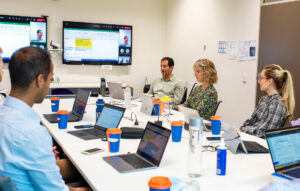
Dr Amir Kosarnia migrated to Australia from Iran via Canada in 2012. He is a rural GP in Mt Gambier, GGT MDRS supervisor, Clinical Educator and now an Australian citizen. ” As I stayed longer in Australia, I felt more connected with this country, and I made the decision to stay here for good. Therefore, obtaining permanent residency and then citizenship became an important goal for me. Now, I have more sense of belonging to this country and I am especially grateful because Australia has been very accepting and kind to me since the very first day I set foot here.”
What did you do prior to studying medicine?
I worked odd jobs including working at my father’s shop sewing shirts. I also did my mandatory military service prior to entering medical school.
Was there a particular event that led you to medicine or what was your deciding factor in choosing to become a doctor?
It was a rather sudden decision. I intended to become an engineer the whole time during high school years but while I was preparing for the university entrance exam, due to a shortage of physicians in Iran some of my friends suggested that I register for medicine entrance examination, and I made that decision essentially over one night.
You migrated to Australia and Mt Gambier and have recently become an Australian citizen, tell us a little about this journey and what it means to you.
I came to Australia from Canada in 2012 and my plan initially was to work here for one year and move back. I even applied and obtained Canadian Citizenship while I was practicing here. However, as I stayed longer in Australia, I felt more connected with this country, and I made the decision to stay here for good. Therefore, obtaining permanent residency and then citizenship became an important goal for me. Now, I have more sense of belonging to this country and I am especially grateful because Australia has been very accepting and kind to me since the very first day I set foot here.
 Please share a little about your current role as a rural GP, MDRS supervisor and Clinical Educator. I am involved with the care of many complex and chronic medical conditions in the clinic and have built good rapport with my patients at Hawkins clinic in Mt Gambier. I have great colleagues in the clinic and consider my workplace, home, and my colleagues, family. I like supervising the medical students and interns. I feel that I am giving back a little of what I have received from my senior doctors and supervisors. The opportunity of teaching at Flinders is fantastic as I keep my knowledge up to date and enjoy the interaction with the future generation of doctors.
Please share a little about your current role as a rural GP, MDRS supervisor and Clinical Educator. I am involved with the care of many complex and chronic medical conditions in the clinic and have built good rapport with my patients at Hawkins clinic in Mt Gambier. I have great colleagues in the clinic and consider my workplace, home, and my colleagues, family. I like supervising the medical students and interns. I feel that I am giving back a little of what I have received from my senior doctors and supervisors. The opportunity of teaching at Flinders is fantastic as I keep my knowledge up to date and enjoy the interaction with the future generation of doctors.
What are some of the highlights and challenges working with students and interns?
The students always come up with good ideas which improves my knowledge and medical practice, but I need to work hard at times to keep up with the standards of teaching. Also, we deal with issues such as anxiety and stress that the students experience and we need to help them navigate through the difficulties they face.
Do you have any memorable moments in your career as a rural doctor that you would like to share?
In the first two weeks that I practiced in Australia, my employer decided to put me in the on-call roster for 10 out of 14 days. It was very challenging as a beginner in a new environment with several odd presentations. However, I managed to pull it off without complications and these two weeks became the most memorable moments of my career.
What are your hobbies – what do you do for down time from work and how do you balance work, life, and family?
I go to the gym, do swimming, go for a walk or jogging. I like listening to music and podcasts. If I find time, I enjoy reading books outside medicine. I try to stay connected with my family and friends, mainly through telecommunication means.
We are keen to attract rural young people to study medicine and health disciplines at Flinders. Do you have any advice or tips for them as someone who lives and works rurally?
It is helpful if they can come and visit rural areas and speak with the doctors and other allied health professional who have lived and worked there. Rural areas are great places for young families. If they can come with their partners/spouses, they are more likely to stay. Cities like Mount Gambier have extensive amenities, are great places to live. One can enjoy many aspects of urban lifestyle and still live in a serene environment.

